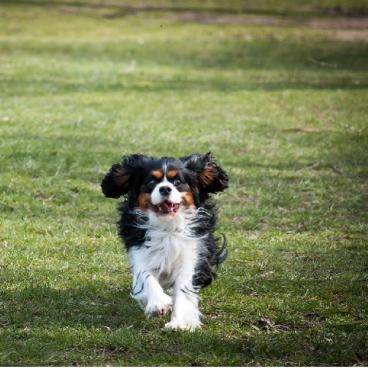Click to view submission information
Primary Immunodeficiency with Pneumocystis Susceptibility, Type 1 (PIPS1) and Type 2 (PIPS2), are two different genetic disorders that greatly increase the risk for Pneumocystis pneumonia and other types of infections. Both of these primary (aka hereditary) immunodeficiency disorders cause a combined immunodeficiency, meaning that they affect function of T and B lymphocytes, two types of white blood cell that are important to fighting off infections.
Who gets PIPS1?

PIPS1 was first discovered in a Shih Tzu. It is caused by a mutation in the CD40 ligand gene. This gene is located on the X chromosome, and the inheritance of the disorder is X-linked recessive. This means that male dogs with a single copy of the mutation are affected but that female dogs require two copies to be affected. PIPS1 is referred to as X-linked Hyper-IgM Syndrome in humans.
At this time, we have not identified the PIPS1 mutation in other breeds. Therefore, if you are interested in testing a dog that is not a Shih Tzu or Shih Tzu mix, we encourage you to contact us first at [email protected] to obtain information on the likelihood that the mutation exists in your breed of interest.
Who gets PIPS2?

PIPS2 was first discovered in a Cavalier King Charles Spaniel. It is caused by a mutation in the CARMIL2 gene. The inheritance of the disorder is autosomal recessive. This means that only dogs with two copies of the mutation are affected.
At this time, we have not identified the PIPS2 mutation in other breeds. Therefore, if you are interested in testing a dog that is not a Cavalier King Charles Spaniel, we encourage you to contact us first at [email protected] to obtain information on the likelihood that the mutation exists in your breed of interest.
What are the clinical signs of PIPS?
PIPS predisposes to recurrent bacterial, fungal, and viral infections. Respiratory infections (e.g., pneumonia) are common with both PIPS1 and PIPS2. Pneumocystis pneumonia is a strong indicator of an underlying immunodeficiency, as this fungal infection does not occur in animals with a healthy immune system. PIPS1 also predisposes to infectious diarrhea from parasites or bacteria. With PIPS1 and PIPS2, diarrhea can also occur from development of autoimmune disease, such as inflammatory bowel disease. Skin allergies and skin infections are common with PIPS2 but less common with PIPS1.
How is PIPS managed?
There is no cure for PIPS. However, once diagnosed, there are management strategies that might help. For example, affected dogs should avoid environments where there is high risk for infectious disease transmission, such as kennels, dog shows, and dog parks. Veterinary care should be sought immediately if respiratory signs (e.g., cough, difficulty breathing), skin abnormalities (e.g., new wound, red area), or diarrhea develops. Standard vaccination recommendations can be followed, but vaccine response might not be fully normal in affected dogs.
Submitting a sample
Step 1 - Select instructions for your sample type
- Blood sample protocol (pdf)
- Cheek swab protocol (pdf)
- Dew claw & tail docking protocol (pdf)
- Semen sample protocol (pdf)
Step 2 - Complete your submission form(s)
Step 3 - Fees & Payment
Any single test
- 1-3 Dogs - $65 each
- 4 or more - $58 each
PIPS1 & PIPS2 "combo" test
- 1-3 Dogs - $100 each
- 4 or more - $85 each
Need cheek swabs?
Cheek swabs are not included in the purchase price. Links to several purchasing options are available within the cheek swab protocol (pdf).
Step 4 - Ship your sample(s)
Result interpretation
Scientific references
- X-linked CD40 ligand deficiency in a 1-year-old male Shih Tzu with secondary Pneumocystis pneumonia. Merrill K, Coffey E, Furrow E, Masseua I, Rindt H, Reinero C. J Vet Intern Med. 2021;35:497-503. https://doi.org/10.1111/jvim.15988
- A Novel CARMIL2 Immunodeficiency Identified in a Subset of Cavalier King Charles Spaniels with Pneumocystis and Bordetella Pneumonia. Coffey, E.L.; Ma, L.; Cissé, O.H.; Kovacs, J.A.; Minor, K.M.; Sukura, A.; Danesi, P.; Friedenberg, S.G.; Cullen, J.N.; Weissenbacher-Lang, C.; et al. J. Fungi 2024, 10, 198. https://doi.org/10.3390/jof10030198